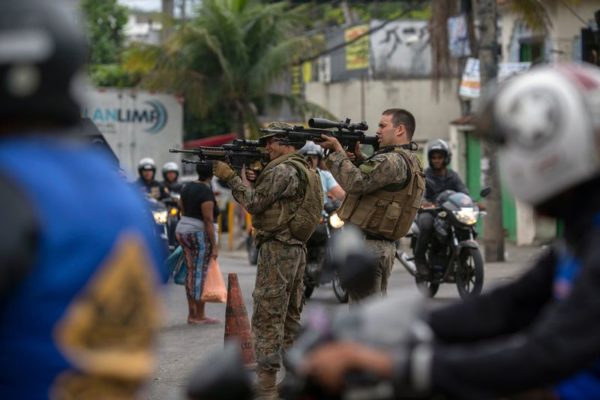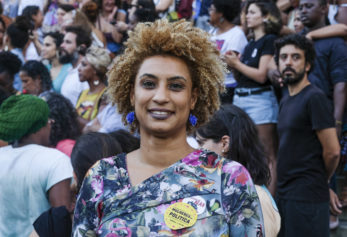A Brazilian state governor has warned gun-toting criminals will face “slaughter” by police as part of a crackdown on drugs and crime in the slums of Rio de Janeiro next year.
A security adviser to Rio de Janeiro state Gov.-elect Wilson Witzel announced this month that teams of marksmen will patrol swaths of Rio with high-powered weapons and a license to kill anyone who gets in their way. The aggressive policing is getting a trial run in the seaside Brazilian city before being implemented nationwide, according to Bloomberg.

According to the governor-elect of the Brazilian state of Rio de Janeiro, the shooters will work in pairs in the city of Rio: one to shoot and the other to monitor conditions and record the killings. (Photo by Mauro Pimentel/AFP via Getty Images)
“The protocol will be to immediately neutralize, slaughter anyone who has a rifle,” Witzel, a federal judge and former Brazilian marine, told journalists in Brasilia on Dec. 12. “Whoever has a rifle isn’t worried about other people’s lives. They are ready to eliminate anyone who crosses their path. It’s a grave problem, not just in Rio de Janeiro, but also in other states.”
As many as 120 sharpshooters will begin accompanying police on their patrols in the slums to take out dangerous criminals who make daily life a harrowing ordeal for local residents. The shooters will work in pairs, the governor-elect said — one to pull the trigger, and the other to monitor conditions and videotape the deaths.
Flavio Pacca, one of Witzel’s longtime associates, said groups of 20 or so officers will start month-long marksman training for the new effort as early as March. Once they learn to kill at 600 meters, they’ll then clear their way into the favelas where gangs and drug criminals often position roadblocks and lookouts to deter the police while fearful residents live under their sway.
Bloomberg reported that robberies and muggings in Rio, which hosted the World Cup final in 2014 and the Summer Olympics in 2016, have doubled since 2011. Meanwhile, murders and homicides reached an eight-year high in 2017 with a total of 5,346 killings. The raft of violence eventually led Brazil’s outgoing president, Michel Temer, to put the military in charge of the state’s security.
However, Brazilian paramilitary groups have become a growing issue in the postcard city, with critics fearing they could soon takeover.
Composed of former police officers, firefighters and military men who wanted to combat lawlessness in their communities, these militias were once lauded by politicians, including President-elect Jair Bolsonaro, the Associated Press reported. Now, the groups are considered one of Rio’s greatest security threats. It’s unclear if they’ll also be targeted in the new “license-to-kill” policing.
“Witzel will create a security council that answers to him directly and envisions a web of surveillance and control,” according to Bloomberg. “He plans public-private partnerships to purchase as many as 30,000 security cameras.”
The governor-elect’s press office said drones will also be used to sniff out known drug traffickers, via facial-recognition technology, to gather evidence on criminals that will aid police in their arrests.
Society and jurists are shifting their views of what constitutes “imminent danger’’ that require lethal force, Paca told Bloomberg, adding that targets don’t need to be actively shooting in order to be taken down by police. The shooters will alternate, with one firing and the other spotting suspects and recording to prove why a person deserved to be killed, he said.
Congressman-elect Alexandre Frota acknowledged the brutal policing might hit a nerve with human rights groups who oppose the deadly tactics.
“The NGOs, human rights activists and United Nations will have a fit,” Frota said on Twitter while sharing video of officers lugging the bloody bodies of two suspected drug traffickers into the bed of a pickup truck. “But the cleansing must be done.’’


